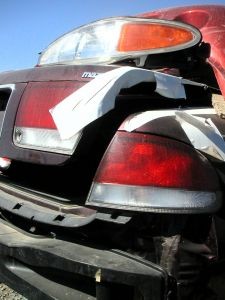According to a recent report from ABC News, Kim Kardashian, along with sisters Khloe Kardashian and Kylie Jenner, and North West (Kim Kardashian and Kanye West’s 1-year-old daughter) were involved in a car accident.
 Authorities say Khloe Kardashian was driving a GMC Yukon, when it slid of the road and crashed into a ditch. Kim Kardashian, her sister, and daughter were all passengers in the vehicle. Initially, a highway patrol spokesperson would not name occupants and only reported celebrities were involved in a car accident.
Authorities say Khloe Kardashian was driving a GMC Yukon, when it slid of the road and crashed into a ditch. Kim Kardashian, her sister, and daughter were all passengers in the vehicle. Initially, a highway patrol spokesperson would not name occupants and only reported celebrities were involved in a car accident.
This single vehicle accident occurred early Sunday morning near Bozeman, Montana. Police are not reporting any injuries, and it is believed the vehicle was able to be driven away from the scene of the accident after being pulled back on the road by an emergency service vehicle.
Continue reading
 Boston Car Accident Lawyer Blog
Boston Car Accident Lawyer Blog







 One Arlington Police officer said he had never seen a crash like this one is his entire 15 year career with the department. An accident reconstruction team was on scene to try to piece together what actually happened, and officers were tracing the assumed path of travel with their flashlights according to witnesses. Another police officer said every aspect of the crash from going airborne to landing on top of a guardrail, and then landing on another car was unbelievable.
One Arlington Police officer said he had never seen a crash like this one is his entire 15 year career with the department. An accident reconstruction team was on scene to try to piece together what actually happened, and officers were tracing the assumed path of travel with their flashlights according to witnesses. Another police officer said every aspect of the crash from going airborne to landing on top of a guardrail, and then landing on another car was unbelievable. Werth first elected to take his case to trial in a bench trial, where he was found guilty and sentenced to 10 days in jail. The judge said she was gravely concerned about his negligent and dangerous actions in which someone could have been seriously injured, and that was the reason for sending him to jail despite, this being his first offense.
Werth first elected to take his case to trial in a bench trial, where he was found guilty and sentenced to 10 days in jail. The judge said she was gravely concerned about his negligent and dangerous actions in which someone could have been seriously injured, and that was the reason for sending him to jail despite, this being his first offense. The driver of the backhoe was also treated on the scene by first responders and transported to a local hospital where doctors say his condition is not life threatening. Westborough Police are not yet sure as to the cause of the accident, and an investigation is still ongoing. It has not been established if backhoe driver was in any way negligently responsible for this tragic accident.
The driver of the backhoe was also treated on the scene by first responders and transported to a local hospital where doctors say his condition is not life threatening. Westborough Police are not yet sure as to the cause of the accident, and an investigation is still ongoing. It has not been established if backhoe driver was in any way negligently responsible for this tragic accident. While no students are reported to have been injured in the bus crash, the dog was killed in the accident, and the man was taken to Tuffs Medical Center. Police have not released his name or his condition following the accident.
While no students are reported to have been injured in the bus crash, the dog was killed in the accident, and the man was taken to Tuffs Medical Center. Police have not released his name or his condition following the accident.